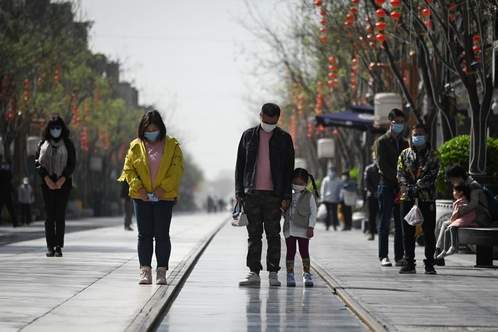WUHAN, China (AFP) — China came to a standstill on Saturday to mourn patients and medical staff killed by the coronavirus, as the world’s most populous country observed a nationwide three-minute silence.
At 10:00 am (0200 GMT), citizens paused, cars, trains and ships sounded their horns, and air-raid sirens rang out in memory of the more than 3,000 lives claimed by the virus in China.
In Wuhan — the city where the virus first emerged late last year — sirens and horns sounded as people fell silent in the streets.
Staff at the Tongji Hospital stood outside with heads bowed toward the main building, some in the protective hazmat suits that have become a symbol of the crisis worldwide.
“I feel a lot of sorrow about our colleagues and patients who died,” Xu, a nurse at Tongji who worked on the frontlines treating coronavirus patients, told AFP, holding back tears.
“I hope they can rest well in heaven.”
State media footage showed Chinese President Xi Jinping and other government officials standing outside a Beijing government compound, wearing white flowers.
Sponsored Links
Here’s What A Online Master’s Degree Should Cost in 2020 in Irvington
Masters Degree | Search Ads
Current Hourly Rates Of Irvington Plumbers – Might Surprise You (Check Now)
Top Plumbers | Search Ads
In the capital’s Tiananmen Square, the national flag flew at half-mast, surrounded by heavier-than-normal security.
Pedestrians in one of the city’s busiest shopping districts stopped walking and kept their heads low in a silent tribute ceremony, while police patrolling the pedestrian zone stood at the side of the road with their shields down and bowed heads.
Trains on Beijing’s subway network also came to a standstill, and AFP saw passengers in on carriage stand silently throughout the three minutes in a mark of respect.
Officials said the observance was as a chance to mourn virus “martyrs” — an honorific title bestowed by the government this week on 14 medical workers who died fighting the outbreak.
They include Li Wenliang, a doctor and whistleblower in Wuhan who was reprimanded by authorities for trying to warn others in the early days of the contagion.
Li’s death from COVID-19 in February prompted a national outpouring of grief as well as anger at the government’s handling of the crisis.
The ruling Communist Party has sought to direct criticism to local authorities in Hubei province and its capital Wuhan, who have been accused of downplaying the severity of the virus, possibly contributing to its spread.
A central government investigation into Li’s death concluded he was “inappropriately” punished by Wuhan police.
Despite drastic measures to lock down Hubei in late January, the epidemic has spiralled into a global pandemic with more than one million cases.
Some restrictions in Hubei have been eased in recent weeks after the officially stated number of new infections in China dropped to near zero.
Saturday’s commemoration also coincided with the annual Qing Ming holiday — the “tomb sweeping” festival — when Chinese people visit the graves of relatives and leave offerings in remembrance.
Although China claims to have curbed the spread of the virus, some restrictions were tightened again this week to prevent a second wave of infections.
Authorities have discouraged visits to cemeteries to mark the festival.
“We advocate people staying home and having small-scale memorials at home to remember the dead,” Fan Yu, an official with China’s department of social affairs, said this week.
Cemeteries across China are offering a “cloud tomb-sweeping” service in which families can honour their ancestors by watching a live stream of cemetery staff attending to graves on their behalf.
Websites are also offering people the chance to pay their respects at a “virtual” tomb, including by lighting a digital candle and leaving a dish of digital fruit.











